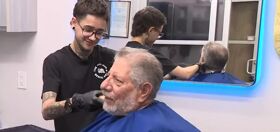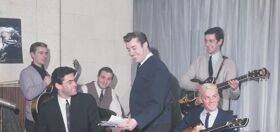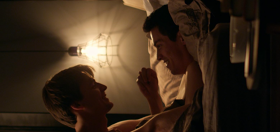
History has a way of erasing queer heritage. But sometimes we get lucky.
Jennifer Tiexiera and Michael Seligman certainly did. A chance discovery of an old box in a storage unit would lead the pair to make their directorial debuts together. Tiexiera cut her teeth editing TV series like Off-Limits and Eyewitness War. Seligman came from writing, working on series such as E! True Hollywood Story and Mysteries and Scandals. The two had never even met when the contents of the box would alter the trajectory of their careers.
Said box contained hundreds of letters to Reno Martin, the alter ego of Hollywood agent Edward Limato, from dozens of his friends. Limato, a gay man, died in 2017 without following requests from his friends to destroy their correspondence. Limato had befriended dozens of gay men and drag queens in 1950s New York. Their letters pulled back the veil of history to uncover life in the queer underground, and a community of friends leading double lives.
Tiexiera & Seligman managed to track down the authors of the original letters, and get them to open up about pre-Stonewall gay life, drag and living on the absolute edge of society. The resulting film, P.S. Burn This Letter Please, saves a delicate moment in history from oblivion, and edifies the people who lived it as the queer heroes they are.
How about we take this to the next level?
Our newsletter is like a refreshing cocktail (or mocktail) of LGBTQ+ entertainment and pop culture, served up with a side of eye-candy.
“The four voices you hear in the film are four of the 15 we found in this box. We chose the main circle of friends who wrote the most often,” Seligman squeals into the phone. P.S. Burn This Letter Please was slated to debut at the Tribeca Film Festival before COVID-19 stalled public display. Still, we caught time to chat with Tiexiera and Seligman about the film, and the arduous process of tracking down drag queens in their 90s.
P.S. Burn This Letter Please is currently seeking distribution.
So how did you two get hooked up?
MS: Well it all started with these letters. Craig Olsen and Richard Konigsberg our producers found these letters. They called me and we sat with them for a long time wondering what to do with these things. They were so fascinating, a window into this very specific underground world. So we kicked around different ideas: books, a play, some kind of scripted thing, and then we landed on a documentary. So I just began trying to collect things, like the interviews. I was talking to people, reading a sh*t ton of books, going online and researching. I was really having a hard time of it. While there’s been a lot written about gay history, there’s not a lot written about gay history pre-Stonewall. And the stuff that is [written] is very different than what we have in these letters.
Sure, yeah.
MS: So collecting these interviews, I’d never made a documentary. Writing is my background. So I thought the story needed somebody who could really take all this stuff to the next level and tell an effective story. And I found Jen on a recommendation. I sent her a bunch of stuff and a very sweet email, and she was like I’ll take a look.
Jen, do you want to take it from there?
JT: Yeah, I mean, I remember getting that email. Most of my work tends to revolve around marginalized communities; that’s kind of the films I gravitate towards. I knew what Michael had put together was super interesting. At that point, it was mostly the story in interviews with three of the queens. But there was one clip in particular: it was Adrian. I’ve never fallen in love with somebody so much. And my brain started racing.

Wow.
JT: I’d been part of the documentary community for about 15 years at that point. I was juggling two other films at the time. But then, after that, I lay in bed after I saw that clip. I called [Michael] the next day and was like if we can dig into this, it could be the gay 13th. This was something that had never been talked about before. And if [Adrian] is alive, there have to be more.
So we had this three-hour long conversation. And we were like let’s do it and see if we can construct this untold history of drag queens in the 50s. So that’s where we hooked up and started tracking them down.
Wonderful. Now, one of the pressing questions I had watching the film was how would you go about even finding these people? They were all using drag names, and these letters were written 65 years ago. Presumably, they didn’t want these letters to be traceable.
JT: We had really small clues. We’d have an address or an age.
MS: The first thing we had done was to have all the letters transcribed and indexed. Then we really started to cross-reference information. We knew they were young, living at home. There were also references in the letters to send to a business address, or that [someone lived with his parents]. So it was a lot of digging. It really did take years. We eventually did hire a private detective who was incredibly helpful.
Wow.
JT: And none of our queens had cell phones. None of our queens have email. Maybe a few have answering machines. So it was a lot of just calling, calling calling. Your youngest queen is 83. Our oldest is 96.
That’s incredible. Were they reluctant to talk? Were they willing?
JT: They weren’t.
MS: Most of them not very. With Michael, I had to talk to him on the phone for a good six months just to meet and say. He was always like call me in a couple weeks. It was just being really persistent. Then we’d ask to shoot an interview and he’d say “Let me think about it.” So then, another process starts. It would go on right up to the day we’d show up with our tiny crew to film it, and they’d say “I don’t know if I can do this.” Then, on the other side of the interview, they’d say “Wow, I didn’t know I needed to talk about this. So thank you.”
JT: Even with Robbie, the first day that we spent with him, we weren’t allowed to shoot anything. Terry, same thing. It was six months of phone conversations. When she agreed to it, we were on a plane right away.
I’m so glad you did get them to talk. Otherwise, the things they talk about would be lost to history. Just some of the things they talk about with gay slang: terms like “trade” or “mop” or “track a room.” I hope those come back into the vernacular.
[Laughter]
One of the lines from the film that really stands out is Adrian’s line, “we didn’t have rights, but who needs ‘em?” There are some major levels to that. Do you think Adrian really believes that? Do you think that nostalgia has numbed the pain of life from those days? Or were they really that happy?
MS: I think it depends on the person. We’ve talked about this before, but I don’t think they ever thought of themselves as heroes. In hindsight, maybe they recognize that. But at the time they were just doing what they were doing to survive and eek out some happiness in a world that was not welcoming. When you talk about Club 82 being this cross-section of mobsters and drag queens and gay people, they were really all people who lived on the outskirts of society. It was this cross-section, but they found each other.

It’s surreal to even think about. Claude’s [one of the queens] story really stuck with me. He speaks very casually about getting committed to Bellevue. The stories of the wig theft had me screaming with laughter. He also has, I would argue, the most touching and powerful moment in the film when he recalls the drag ball and helping—is it Daphne—get dressed. He goes to pieces in that scene, and its heartbreaking.
JT: Mmmhmm.
For a moment though, he looked young. There’s something so youthful and energized about him in that moment. What is it about these folks revisiting the past that brings out that youthful fire?
JT: They completely lose themselves. The thing that’s so amazing about that scene—and I think Michael, you’ll agree, that is the most powerful scene—these guys are going back 50, 55, 60 years to remember those moments. They haven’t been asked about it in that long. We’re bringing up times that were really beautiful memories for them. Michael would ask “Tell me about Daphne.” And we’d watch them process these stories. It’d make for long interviews, but it paid off. Ultimately they were able to go back to these moments and recreate them. Once they started going, they’d revert to that time.
Yeah.
JT: You see them get lost. Claude had no idea we had a photo of [Daphne, who Claude helped dress]. He described it exactly. That was 1955.
MS: And he in that moment is really going through some kind of meditation. We all have our phones and can look back at pictures from 10 years go. We have all these constant reminders. He never saw that photograph. He remembers it from when it happened. The level of detail he had in his memory is bonkers. And I can’t remember what I had for lunch…
[Laughter]
MS: It speaks to how special those moments were in a life that wasn’t so special. He was getting beat up at home and spending time in the hospital and turning tricks to eat. For someone who, that’s their life, to have a moment like this, it’s everything. And it was one night a year. “One night a year we got to be ourselves.” I was burned into his memory. He was happy, at his best.
One of the more bizarre notions, by my youthful standards, anyway is the idea that drag was not considered a queer performance art. Terry does drag on a Navy ship. The drag clubs attracted tourists. Drag had pop value. A novelty. When do you think that changed?
JT: I think it was the opposite. It was more, I hate to say it, but it was a performance by stigmatized people for “the normal.” It was looked at as a freak show. Who’s the boy? Who’s the girl? The queens described going through the audience and seeing men recoil. As exquisite as it was, the art form wasn’t cherished the way it was as for each other, like at a drag ball. And again, that was only one night a year.
MS: Drag was much more underground. It was not what it is today.
Related: Fire Island’s underground drag history revealed in absorbing new doc
Right.
MS: Club 82 was one of maybe two drag bars in New York City. You had to seek it out. It was subversive. People were shocked by it. In a lot of these performances, the queens were pulling off the illusion so well that at the end they’d have to drop their tops and pull their wigs off to prove they’re men.

Wow.
MS: People couldn’t wrap their heads around it. It’s not in the film, but Thomasine in his interview, talks about how the customers would sit and say “Look how he walks. That can’t be a man. Look at his hands! His legs! His teeth!” And in terms of Lennie dressing up on the ship, it was dressing as a woman because it was funny. I don’t think you can discount the amount of misogyny that went into that.
No.
MS: When you look at Milton Berle when he’d do drag, it was poking fun at women, whereas gay men who were doing it were celebrating women and the feminine aspects we all have.
JT: They weren’t prepared for that. Lenny even says had he been [on the ship] much longer, he would have been outed.
Is everyone still alive and healthy? Are you in touch?
MS: Yeah. We talk to them quite often. They were really bummed, because they were going to be at the Tribeca premiere. And they were excited because they’re now seen as heroes. I don’t think they ever saw themselves as heroes. So to have them come see the film and get applause on their home turf—we were also excited to witness it. But you talk to them and they’re like oh whatever.
JT: Michael got a letter from Jim Vidgood being like “It ain’t no big thing. I’ve lived through…” And it was half a page of the Great Depression, McCarthyism…
MS: World War II.
JT: We were cracking up. This was a small blip. But we’ve all envisioned them standing up for the huge round of applause they deserve. Eventually, fingers crossed.

Here’s hoping. Hopefully everyone will hold on. I’d love to attend that. They are heroes with a special story to tell.
Now, I have to ask, because you hadn’t even met each other when all this started, how do you, as co-directors, find a good working dynamic?
MS: Mostly arm wrestling. Jen always wins.
[Laughter]
MS: No. I think we have very different skill sets. We came up in different ways, Jen from editing, me from writing. So I dunno. I feel like there are things when Jen feels very adamant about something, I tend to say “Yeah, that’s good.” And I think that goes both ways. We’ve had our moments, but we figured it out.
JT: Yeah, honestly, it’s been, from the beginning, I think it’s about the easiest working experience I’ve ever had. Our core is the same. What we wanted the film to be is the same. What we love and love about the film and the queens—we always go back to that as our tie-breaker. We want to properly represent the story we set out to tell. That’s been our saving grace. Our visions were so aligned. Even in the beginning it felt like we knew each other much longer. Now, I don’t remember it before.
MS: Our whole editing facility was in Jen’s home. So going there every day, sitting with Jen and Alex our other editor, you know, we became a family. Craig and Richie I’d already been friends with a long time. So the whole project really has been a family affair. It’s a great experience I’ve never had [before]. All of our mutual love of this story has constantly gotten us through the tougher times.
Will you collaborate again?
JT: Absolutely. We’re sitting on a goldmine. We have so much more footage.
PS Burn this Letter Please is currently seeking distribution.




















